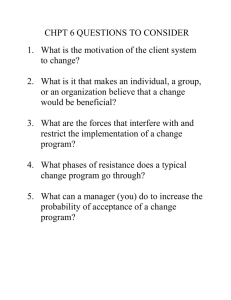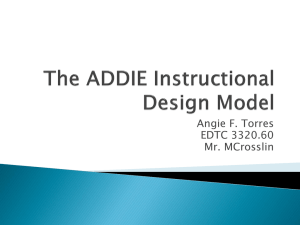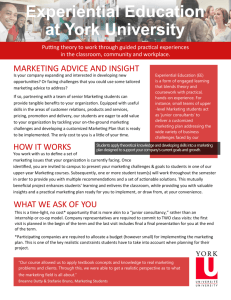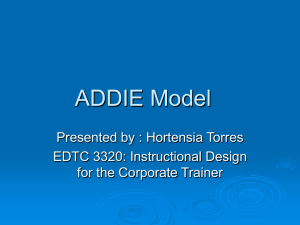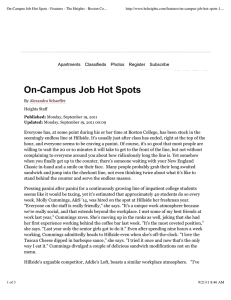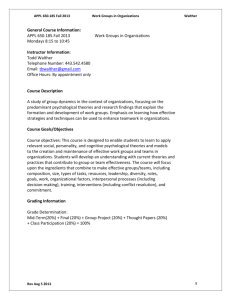Training & Organization Development Course Syllabus
advertisement
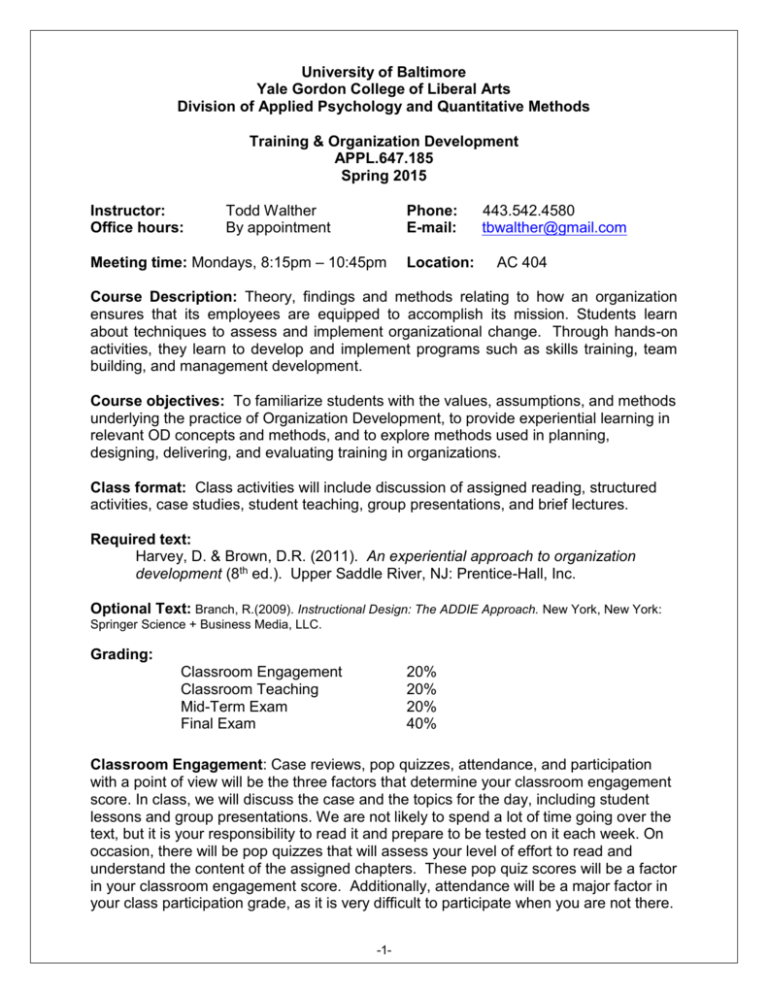
University of Baltimore Yale Gordon College of Liberal Arts Division of Applied Psychology and Quantitative Methods Training & Organization Development APPL.647.185 Spring 2015 Instructor: Office hours: Todd Walther By appointment Phone: E-mail: Meeting time: Mondays, 8:15pm – 10:45pm Location: 443.542.4580 tbwalther@gmail.com AC 404 Course Description: Theory, findings and methods relating to how an organization ensures that its employees are equipped to accomplish its mission. Students learn about techniques to assess and implement organizational change. Through hands-on activities, they learn to develop and implement programs such as skills training, team building, and management development. Course objectives: To familiarize students with the values, assumptions, and methods underlying the practice of Organization Development, to provide experiential learning in relevant OD concepts and methods, and to explore methods used in planning, designing, delivering, and evaluating training in organizations. Class format: Class activities will include discussion of assigned reading, structured activities, case studies, student teaching, group presentations, and brief lectures. Required text: Harvey, D. & Brown, D.R. (2011). An experiential approach to organization development (8th ed.). Upper Saddle River, NJ: Prentice-Hall, Inc. Optional Text: Branch, R.(2009). Instructional Design: The ADDIE Approach. New York, New York: Springer Science + Business Media, LLC. Grading: Classroom Engagement Classroom Teaching Mid-Term Exam Final Exam 20% 20% 20% 40% Classroom Engagement: Case reviews, pop quizzes, attendance, and participation with a point of view will be the three factors that determine your classroom engagement score. In class, we will discuss the case and the topics for the day, including student lessons and group presentations. We are not likely to spend a lot of time going over the text, but it is your responsibility to read it and prepare to be tested on it each week. On occasion, there will be pop quizzes that will assess your level of effort to read and understand the content of the assigned chapters. These pop quiz scores will be a factor in your classroom engagement score. Additionally, attendance will be a major factor in your class participation grade, as it is very difficult to participate when you are not there. -1- Your participation in these discussions will also determine your class participation grade. Classroom Teaching: Each student is responsible for teaching a 30-45 minute session based upon the chapter or topic selected by or assigned to the student. The grade will be assigned based upon quality of the teaching presentation, completeness of coverage of the assigned topic, level of understanding demonstrated over the topic, inclusion of new materials outside of classroom text material that improves level of student understanding of the topic, and strength of the point of view. Each will be rated on a scale of 1- 20 for a total of up to 100 points for a teaching grade. Classroom Teaching Topics (suggestions only – you may go outside this list with permission) Training - ADDIE model Organization Redesign E-learning / blended Workforce Planning learning Talent Management Change Management Knowledge Management Succession Planning Consulting Skills Leadership Development Contracting Skills Executive Coaching Culture Assessment / High Potential Programs Engagement Surveys Mentoring Programs Human Performance Improvement (ASTD HPI Career Development / Model) Career Ladders Facilitation Techniques Performance Management Team Building Final Exam: The final exam will be a comprehensive test of all information learned during the entire semester. No collaboration or sharing of work is allowed from the time the test is distributed until the time it is collected for grading. The University of Baltimore’s Academic Integrity Policy will be used as guidance, and at a minimum, such collaboration will result in non-credit for work, a “zero” for the work submitted. Schedule of Assignments: The course schedule is subject to change over the course of the semester based upon pace of the class, interest of the students, and possible emerging topics of greater relevance to support course objectives. -2- Training & Organization Development Course Overview APPL.647.185 Fall Semester, 2011 Text: Harvey, D. & Brown, D.R. (2011). An experiential approach to organization development (8th ed.). Upper Saddle River, NJ: Prentice-Hall, Inc. Optional Text: Branch, R.(2009). Instructional Design: The ADDIE Approach. New York, New York: Springer Science + Business Media, LLC. 1/26 2/2 2/9 Topic Introduction None Organization Development Read Chapter 1. Read Case TGIF. Organizational Renewal Read Chapter 2. Read Case: The NoGo Railroad. Read Chapter 3. Read Case: The Dim Lighting Co. Changing a Culture Role and Style of the OD Practitioner Assignment Student Role Student Teach #1 Read Chapter 4. Read Case: The Grayson Chemical Company. Student Teach #2 The Diagnostic Process Read Chapter 5. Read Case: The Old Family Bank. Student Teach #3 Overcoming Resistance to Change Process Intervention Skills Read Chapter 6. Read Case: The Hexadecimal Company. Read Chapter 7. Read Case: The OD Letters. Student Teach #4 OD Intervention Strategies Mid Term Exam Read Chapter 8. Read Case: The Farm Bank. No Class Spring Break Employee Empowerment and Inter. Interventions Read Chapter 9. Read Case: The Sundale Club. Student Teach #7 Team Development Interventions Independent Study Read Chapter 10. Read Case: Steele Enterprises. Student Teach #8 Intergroup Development Interventions Read Chapter 11. Read Case: The Exley Chemical Company Student Teach #9 Goal Setting for Effective Organizations Read Chapter 12. Read Case: Western Utilities Company. Student Teach #10 4/13 Work Team Development Read Chapter 13. Read Case: Wengart Aircraft. Student Teach #11 Read Chapter 14. Read Case: Tucker Knox Corporation. Read Chapter 15. Read Case: The Space Electronics Corporation. Student Teach #12 4/20 High Performing Systems Learning Orgs Organizational Transformation and Strategic Change The Challenge and the Future for Organizations Course Review and Student Teaching Read Chapter 16 Read Case: The Bob Knowlton Case Begin Final Review of Course Content Student Teach #14 5/4 Course Review and Prep for Final Exam Review all materials and prepare for mock Final Exam 5/11 FINAL EXAM 2/16 2/23 3/2 3/9 3/16 3/23 3/30 4/6 4/27 Independent Study -3- Student Teach #5 Student Teach #6 Student Teach #13 Student Teach #15 Student Teach #16 Student Teach #17 Student Teach #18 Et al. FINAL EXAM
